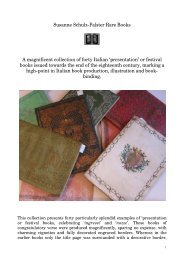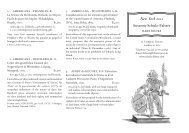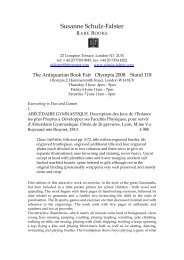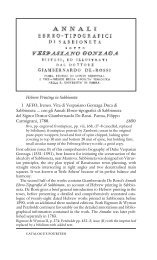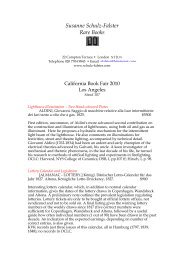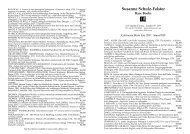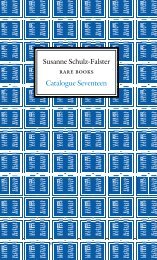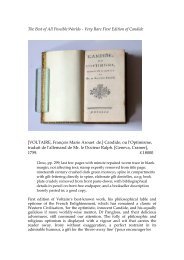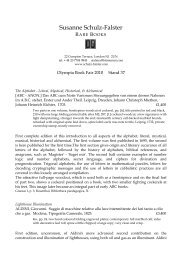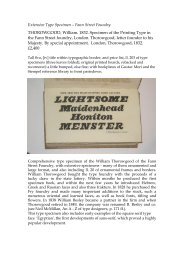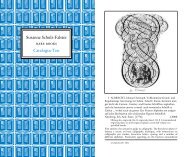Susanne Schulz-Falster Catalogue Ten
Susanne Schulz-Falster Catalogue Ten
Susanne Schulz-Falster Catalogue Ten
Create successful ePaper yourself
Turn your PDF publications into a flip-book with our unique Google optimized e-Paper software.
30 [BERINGTON, Simon.] Memoires de Gaudence de Luques,<br />
Prisonnier de l’Inquisition: Augmentés de plusieurs Cahiers qui<br />
avoient été perdus à la Douane de Marseille: Enrichis des savantes<br />
Remarques de Mr. Rhedi. Premiere Partie [–Quatrieme Partie].<br />
Amsterdam et Leipzig, Arkst & Merkus, 1754. £500<br />
Four parts in two volumes; 12mo, engraved frontispiece to all four<br />
volumes, pp. [iv], lxiv, 98; [iv], 154; [iv], 148; [iv], 166, [1] errata;<br />
titles printed in red an black, with title vignettes and typographic head<br />
and tail-pieces; paper occasionally lightly browned; contemporary full<br />
mottled calf, boards with triple gilt Wllet, Xat spines decorated in gilt,<br />
with matching gilt-lettered label and lettering piece; an attractive set.<br />
Second French translation of Berington’s utopia, the Memoires of Sigr.<br />
Gaudentio di Lucca, Wrst published in 1737. With this translation by Dupuy<br />
Demportes, which was Wrst published the previous year, Berington’s adventure-utopia<br />
became a Europe-wide bestseller, and in addition to numerous<br />
further French editions, two separate German translations appeared.<br />
The utopia is based on the confessions of the main protagonist Gaudence<br />
before the Inquisition, where he tells of his adventures and travels in the<br />
land of the Mezzoranies. The inhabitants of this utopian land, connected<br />
with just one road to the outside world, lived happily, in equality, without<br />
restricting laws, and well-provided for with store-houses and abundant supplies.<br />
Gove, p. 297; Hartig 40; Negley 93; see Lee M Ellison, Gaudentio di Lucca, a forgotten<br />
utopia, 1935.<br />
31 BETTINELLI, Saverio. Dell Entusiasmo delle Belle Arti.<br />
Milano, Giuseppe Galeazzi, 1769. £650<br />
8vo, pp. xvi, 416; woodcut vignette to title; uncut in the original limp<br />
boards; spine lettered in manuscript; some show-through to endpapers;<br />
a Wne copy.<br />
susanne schulz-falster rare books catalogue ten<br />
First edition of Bettinelli’s inXuential treatise on aesthetics and cultural politics.<br />
Saverio Bettinelli (1718–1808), a Mantuan Jesuit, stresses the power<br />
of ‘nature’ and ‘feeling’ in literature, and calls for a reform of the Italian<br />
poetic tradition. With this work he appeared to be at the forefront of enlightenment<br />
thinking, although his later works proposed closer allegiance<br />
to modern classicism in the Jesuit tradition.<br />
Melzi I, 357; uncommon, RLIN and OCLC list just one copy at Columbia University.<br />
Poem in Praise of Tuscan Economic Reforms<br />
32 BETTINELLI, Saverio. Sciolti sopra il libro intitolato<br />
Governo della Toscana sotto il Regno di sua Maestà il Re Leopoldo<br />
Secondo. Firenze, Gaet. Cambiagi, 1791. £450<br />
4to, pp. xvi; contemporary limp boards, with faint presentation<br />
inscription in ink by the author to foot of title page.<br />
First and only edition, very rare, of Bettinelli’s blank verse appraisal of<br />
Leopold II, the Grand Duke of Tuscany, and of Gianni’s Wnancial account<br />
of the economic reforms carried out under his reign, before he became<br />
Emperor of the Austro-Hungarian Empire in 1790. Leopold II was one of<br />
the most capable and remarkable of the reforming princes of the eighteenth<br />
century, and Bettinelli charts the diVerent areas of his reform, be they administration,<br />
the legal system, or public accounting.<br />
DBI IX, 738–744; not in Kress or Goldsmiths’, no copy found in RLIN or OCLC.<br />
Farming for Ladies<br />
33 BEYER, Moritz. Landwirthschaft für Frauen. Der<br />
GeXügelhof, die Schweizerei, das Milchwesen und die Zucht und<br />
Benutzung der Schweine. Nach dem Englischen für Deutschland<br />
bearbeitet von Moritz Beyer. Leipzig und Pesth, Verlags-Magazin,<br />
1845. £150<br />
8vo, pp. xviii, 374, numerous wood engravings in the text, some light<br />
spotting and foxing; mid-nineteenth century boards, original pictorial<br />
printed upper wrapper bound in; a good copy with unsigned<br />
calligraphic presentation inscription on front free endpaper.<br />
First edition in German of this introduction to agriculture for women.<br />
Based on John French Burke’s Farming for Ladies: a guide to the poultry<br />
yard, the dairy and piggery by the author of British Husbandry, this treatise<br />
is translated and adapted to the German situation by Moritz Beyer, who is<br />
best known for his guidebooks for emigrants to America.<br />
Not in NUC or RLIN, no copy in Kress or Goldsmiths’; for Burke’s British Husbandry,<br />
see Goldsmiths’–Kress 28471.



